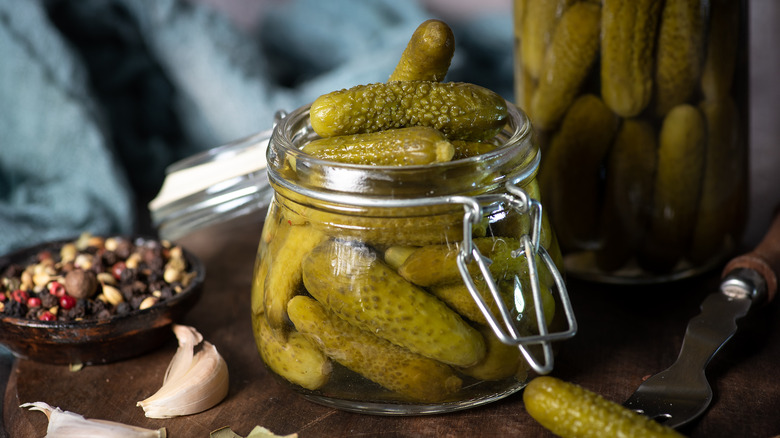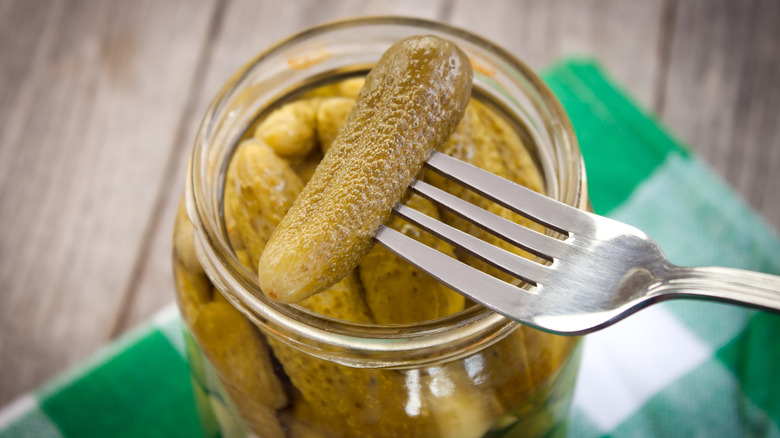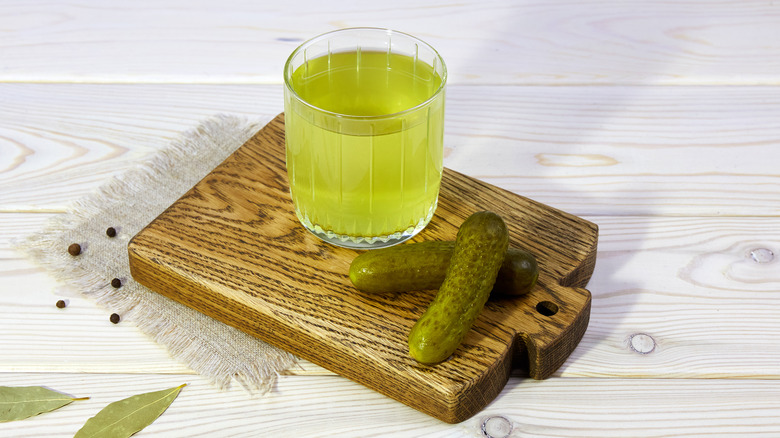How Long An Open Jar Of Pickles Lasts In The Fridge
Pickles last a long time — some would even say forever. While it's likely that you'll get through a whole jar of store-bought pickles before they have a chance to go bad, they do eventually spoil. Refrigerated pickles (different from shelf-stable pickles, but we'll come back to that) can sit for several months, provided that they are unopened and stored in a properly cold fridge. Once opened, however, a jar of pickles should be kept for no longer than three months.
The pickles you buy in the refrigerated section at the store have been treated with a "quick" pickling method, which is a less thorough preservation process that gives them a shorter shelf life. Shelf-stable pickles, on the other hand, have been fermented and pasteurized, meaning they can sit on a shelf at room temperature for a few years. After this point, they can still be safe to eat, but their quality will decline. Once opened, tightly resealing the jar and storing it in the fridge will help shelf-stable pickles last for up to two years.
Storage guidelines for pickles are easy to follow: If your pickles are sold refrigerated, put them straight in the fridge when you get home. If they're sold on a shelf, feel free to put them in a cupboard or down in your basement until you're ready to open the jar.
Signs your refrigerated pickles are going bad
An expired pickle is probably a foreign concept to most of us. How do you tell when a preserved product goes bad, especially one that already smells strongly and doesn't have a very "fresh" appearance? The first sign of a spoiled pickle is that its scent will change from pleasantly tangy to a very strong, sour smell, which goes hand-in-hand with a more sour taste. Your pickles shouldn't be way more sour than they were when you opened the jar.
Next, look for visual signs, like changes in color and texture. Over time, pickle juice becomes cloudy, and the pickles themselves might turn dull and brown. Discolored pickles will also take on a mushier texture, as opposed to their original crunch. They won't be very enjoyable to eat this way, so it's time to toss them.
If pickles are left long enough, they'll even start to grow mold. Contrary to popular belief, the acidity of pickle juice will not prevent mold from forming, but only slow its growth. If you see mold or any other signs of spoilage, do yourself a favor and toss the whole jar in the trash -– don't even save the juice for future pickles, which you can do with a fresher jar.
Use up those pickles before they go to waste
If you have a huge jar of opened pickles, and you're not getting through it as quickly as you planned to, it's good to use a pickle-centric recipes for quick consumption. For instance, you can use pickle juice for a turkey brine, giving your bird a nice hit of flavor and tenderness using the salt, vinegar, and other seasonings found in the juice. Another way to use up excess pickle juice is by simply drinking it. Rich in electrolytes like sodium and potassium, pickle juice is an underrated choice for hydration after a heavy workout or activities in hotter climates.
That being said, only serious pickleheads might want to drink the juice. To focus on the pickles themselves, you can finely shred them for a delicious dill pickle soup, keeping your stomach warm and full during the winter months. Alternatively, you can add them to any kind of salad for extra crunch and flavor, or even pop them in the air fryer for a crispy restaurant-style treat. Fried dill pickle chips coated in panko? Yes, please! With these ideas, you likely won't be left hemming and hawing over whether or not your pickles have gone bad.



